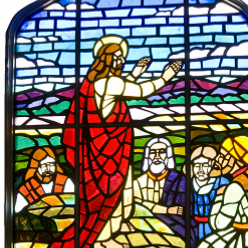Mark’s Gospel was not a formal work of history; it was an account of Jesus’ life based on Peter’s teaching. It shows Jesus as a man who exercised the power of God to heal and transform lives, and who died purposefully, albeit after being betrayed. He was crucified by the Romans, but without having been convicted of a crime under Roman law.
Jesus’ teaching
Mark repeatedly reported that the people were amazed by his teaching:
- They were amazed to find that Jesus taught with authority (not like the “interpretive†teaching of the scribes) – Mark 1:22.
- They were amazed that Jesus had the power to give orders to evil spirits and that they obeyed him – Mark 1:27.
- They were amazed that Jesus claimed to be able to forgive sins – Mark 2:12.
- In the territory of Gerasa, the people were amazed by the testimony of the healed man – Mark 5:20.
- When Jesus returned to Nazareth and taught in the synagogue in his village, the people asked, “Where did he get this great wisdom and how does he perform these miracles?†– Mark 6:2-3.
- When Jesus was seen to walk on water, Mark explained their amazement by noting that the disciples had not understood the full implications of the recent miracle of the feeding of the five thousand – Mark 6:51-52.
- After Jesus’ triumphant entry into Jerusalem, the chief priests and the scribes were afraid to take action because “all the people†were amazed as Jesus’ teaching – Mark 11:18.
- Pilate was amazed that Jesus made no attempt to defend himself against the false charges brought against him – Mark 15:5.
- Even the women who saw the empty tomb were so distressed and terrified that they did not report this event to anyone – Mark 16:8.
Even Mark’s account of the resurrection event suddenly ends with the report of the amazement and fear of the women. It has the appearance of being unreasonably truncated. Yet the form of his telling of this story can be explained on the basis that one of Peter’s themes was that Jesus’ power and authority was beyond the comprehension of his contemporaries.
A supplementary account
In dealing with the resurrection, Mark ended his Gospel at the very point Peter ended one of his sermons on the subject of the inability of anyone at all to fully understand Jesus’ divinity during his lifetime, not even his chosen disciples. Indeed, Mark’s account in particular shows that no one really understood Jesus’ power and authority until after the full implications of Jesus’ resurrection dawned on his disciples. (There is little doubt that, after Jesus’ resurrection, Peter understood from personal experience the transforming power of the Holy Spirit in his own life.)
Given the brevity of Mark’s account of the resurrection, one is led to conclude that Mark must have been relying upon his readers knowing other reports of this event. Similarly, we can see from the absence of extended sections dealing with Jesus’ teaching (he has only the parable of the sower) that Mark was not trying to produce a history that was complete in itself. The mostly likely scenario is that his readers knew Matthew’s Message, the text underlying our Gospel of Matthew. There is no shortage of teaching material in that work, including the famous Sermon on the Mount.
Thus we can conclude that the Gospel of Mark was written as a supplement to Matthew’s Message, rather than being intended to supplant it.
Mark in Matthew and Luke
Since the Gospel of Mark was written as a supplement to the Matthew’s Message, it was not difficult to add Mark’s text to that work, thereby producing the Gospel of Matthew. There was almost no overlap, and the majority of the Gospel of Mark has been reproduced in the Gospel of Matthew.
Similarly, it is not difficult to find the original text of Matthew’s Message. Most of the work involved is simply a matter of recognizing the similarity in the words and phrasing used in both works.
It is a little more difficult to find the borrowings from the Gospel of Mark in the Gospel of Luke, since they did cover much of the same material. Nevertheless, the same technique of recognizing the similarity in the words and phrasing used in both works remains effective.
Therefore, we can say that while the Gospel of Mark is the first completed “Gospel” that has come down to us, it was not the first gospel account to be written.
